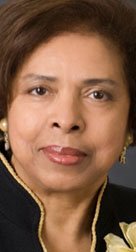The broader view, by Dr. E. Faye Williams
12/31/2020, 6 p.m.
I remember the commonly accepted phrase describing politics as, “All politics is local.” The obvious understanding is that the individual politician and his/her constituents are best served when the interests of the “local” constituents, not partisan interests, are paramount in policy decisions.
Then, it was not uncommon for votes in the U.S. Senate and House to cross party lines, as well as the development of deep and abiding cross-party friendships that are unthinkable today.
Those who speak of those days frequently refer to the friendship between Sen. John McCain, a Republican from Arizona, and Sen. Ted Kennedy, a Democrat from Massachusetts. Although in opposition on many issues, they were known as best friends, dedicated to achieving policies that benefited the majority of Americans.
Their friendship notwithstanding, from the time they joined the Senate until their final appearances there, an erosion of collegiality and willingness to separate partisan politics from the interests of Americans occurred. Whatever the source or reason, it has crippled the ability of legislators to achieve their greatest constitutional mandate to “create a more perfect union.” Rather than seeing their political opponents as differing in opinion, they now view them as enemies whose ideas and interests have to be crushed into the dirt of political preference. Sadly, those who vote for them accept the same enmity.
Until there is a willingness to revert to the attitude of “doing what is best for all or most citizens,” we will be mired in a swamp of conflict and discontent. This we see in the current COVID-19 economy. While a select number and class of Americans prosper and billionaires increase their wealth exponentially, larger numbers of Americans face imminent eviction, food insecurity and a myriad of problems associated with looming or absolute poverty. Small business owners who have spent their years, effort and meager wealth to serve their communities are witnessing their efforts evaporate.
For eight months, our Republican Senate refused negotiations or acting on a relief package for the average American. Proposals offered by the U.S. House of Representatives gathered dust on the desk of Senate Majority Leader Mitch McConnell, a Republican from Kentucky. He single-handedly held the majority of Americans dangling on a string of economic insecurity.
In the “Eleventh Hour,” he and his Republican Caucus agreed to negotiate a miserly relief package that will not meet the real needs of those who have suffered since May. As the “Grim Reaper” to Democratic policies, his singular interest has been in shaping the federal court system with conservative judges — many unqualified — who will legislate conservative causes from the bench.
All is not lost! As has been done in our short national history, citizens can act in concert to achieve legislation that does not extend the hand of preference to the wealthy or industrial class. Our challenge is to abandon the belief that our only concern is what is happening in our own city, county or state.
As most voters know, the state of Georgia has two unresolved U.S. Senate races that have scheduled run-off elections. The results of these elections will determine control of the Senate. Because the election outcomes have a broader impact on the nation, we must broaden our view of how we can affect the outcome.
If we are Georgia residents who are registered to vote, we must evaluate the candidates who best represent our interests and the interests of those we value. We must then vote! It’s that simple!
If we are not Georgia residents, we cannot vote. But we can encourage the Georgians we know to GOTV and we can contribute. Political campaigns run on money. Presently, for many, money is scarce, but we must consider the chaos another McConnell term as Senate majority leader will cause.
The writer is president of the National Congress of Black Women.







